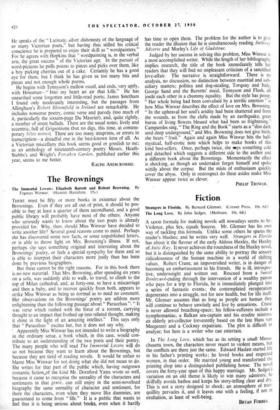The Brownings
The Immortal Lovers: Elizabeth Barrett and Robert Brim ning. By Frances Winwar. (Hamish Hamilton. ISs.) THERE must be fifty or more books in existence about the Brown ings. Even if they are all out of print, it should be pos- sible to buy at least a quarter of them secondhand, and a good public library will probably have most of the others. Anyone who seriously wants to know about the two poets is already provided for. Why, then, should Miss Winwar have decided to write another life? Several good reasons come to mind. Perhaps she has discovered some new facts, or some unpublished letters, or is able to throw light on Mrs. Browning's illness. If not, perhaps she says something original and interesting about the Brownings' poetry, or feels a special sympathy for them and so is able to interpret their characters more justly than has been done by previous biographers.
But these cannot be the right reasons. For in this book there is no new material. That Mrs. Browning, after spending six years on a sofa, was suddenly able to walk, to travel, to climb to the top of Milan cathedral, and, at forty-one, to have a miscarriage and then a baby, and to recover quickly from both, appears to strike Miss Winwar as being so normal as to need no comment. Her observations on the Brownings' poetry are seldom more enlightening than the following passage about " Paracelsus": " It was verse which rushed with the force of a torrent, carrying thought to an impact that frothed up into related thought, making it shine in the light of an amazing intellect." This says only that " Paracelsus " excites her, but it does not say why.
• Apparently Miss Winwar has not intended to write a biography in the ordinaey sense, a book which, in this case, would con- tribute to an understanding of the two poets and their poetry. The many people who will read The Immortal Lovers will do so not because they want to learn about the Brownings, but because they are tired of reading novels. It would be unfair to blame Miss Winwar for not doing what she did not mean to do. She writes for that part of the public which, having outgrown romantic fiction.of the kind Mr. Dornford Yates wrote so well, because it came to recognise the unreality of the characters and sentiments in that genre, can still enjoy in the semi-novelised biography the same unreality of character and sentiment, for there the characters, even when they move like dummies, are guaranteed to come from " life." It is a public that wants to feel that it is being serious about books, even when it hardly has time to open them. The problem for the author is to give the reader the illusion that he is simultaneously reading Anthony Adverse and Morley's Life of Gladstone.
Judged by her success in solving this problem, Miss Winwar is a most accomplished writer. While the-length of her bibliography implies research, the title of the book immediately tells her readers that they will find no unpleasant criticism of a sanctified love-affair. The narrative is straightforward. There is no analysis, no discussion, no distinction between essential and sub- sidiary matters; politics and dog-stealing, Torquay and Italy, George Sand and the Barretts' maid, Tennyson and Flush, all jostle each other in a chummy equality. But the style has pomp. Her whole being had been convulsed by a terrific emotion " is how Miss Winwar describei the effect of love on Mrs. Browning. " In the upheaval her soul's aridity had been shattered and from the wounds, as from the clefts made by an earthquake, great bursts of living flowers blessed what had been so frightening." Campaniles sing, " The Ring and the Book" starts as a "dim dark seed deep underground," and Mrs. Browning does not give birth, she bears " fruit." Again and again Miss Winwar hits the half- mystical, half-erotic note which helps to make books of this kind best-sellers. Once, perhaps twice, she says something cold and detached which suggests a different side to the author and a different book about the Brownings. Momentarily the effect is shocking, as though an undertaker forgot himself and spoke wittily about the corpse. But the mists of enthusiasm quickly cover the abyss. Only in restrospect do these asides make Miss Winwar appear twice as clever.
PHILIP TROWER.


















 Previous page
Previous page